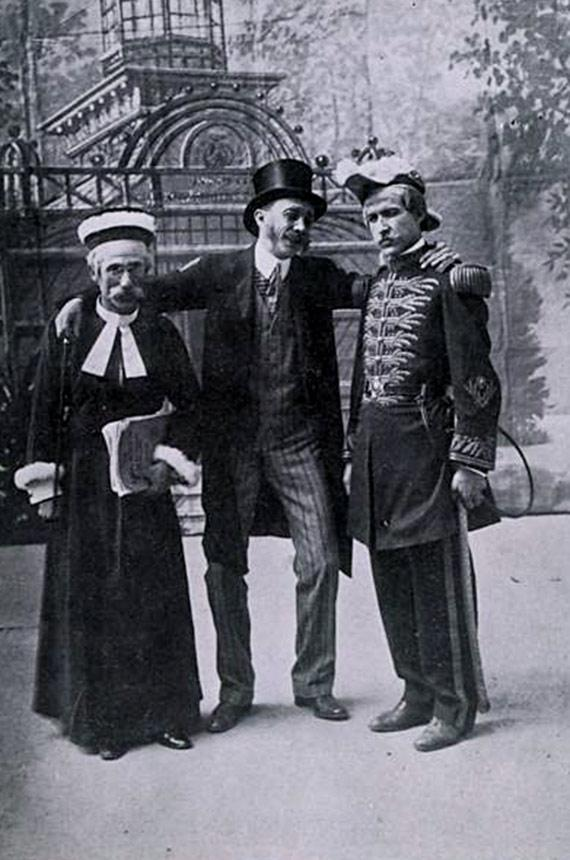Paz e Amor (lost Brazilian comedy film; 1910)
Paz e Amor (Peace and Love in English) is a 1910 Brazilian comedy film directed by Alberto Moreira and produced by William e Cia. It was one of the most famous "sound" films in Brazil, with actors dubbing themselves live, behind the screen, based on images already recorded.[1]
The film was a criticism of President Nilo Peçanha, who upon taking office, declared to reporters: "I will create a government of peace and love." The names of the main characters covered well-known figures in the political and social scene of Rio de Janeiro.
Color version
From July 1910, the film began to be shown in a color version, with the negatives being hand-painted and "with a new apotheosis".[2]
Main Cast
- Luís Bastos as Tibúrcio da Anunciação
- Ismênia Mateus as Candidatura
- Amica Pelissier as Presidência
- Mercedes Villa as Vatapá
- Antonio Cataldi as Olin I
Plot
The action takes place in the World of the Moon. In a rich palace, the butler finishes the preparations for a large cinematograph, in which the surprising tapes of King Olin I will be shown. The sound of the bugle announcing the arrival can be heard in the distance. of the King, who then enters, accompanied by his entire entourage. Tibúrcio of the Annunciation is expected, who comes to visit the kingdom of Olin I. He receives him with all affability and offers him the Press as cicerone, but Tibúrcio refuses this lady who, although very talkative and always busy 'hunting' the penny, he will not play the role as well as he would like.
Well, let another compadre come; and emerges from a magical and hierophantic cloud, Mussiú Baboseira, dressed as a magician. Tibúrcio accepts it, says goodbye and goes on a visit to the city. The review begins. They enter the Avenue, in front of the Casa Americana. Tibúrcio finds himself on the terrace of a café in the company of several consumers. Then Fifi, the city's binocular, who is the editor of Binocular, passes by, surrounded by several ladies who are vying for a compliment.
Next comes the terrible German band, the biter, the sanctified courier (a postman in a cassock), Politics, represented by two well-known political leaders from the District, etc. This is followed by another painting in the Praça da Aclamação. Tibúrcio goes to admire our famous garden, always deserted, and there he sees the Viúva Alegre, the presidency and two big names who are vying for it, the happy genre cinema, the vatapá, the animal game and the civil guard. In honor of the candidate from Bahia, Rui Barbosa, the actress Maria da Piedade, in the role of Vatapá, gave a musical recipe: '...Take pepper and dendê/ (...) Take pirão of flour,/ Giló mincedinho, you quingombô,/ Fish shredded or chicken,/ Your grated coconut, yo-yo'.
The last painting is in São Francisco square. A speaker harangues the people and suddenly there is a noise. Then appears the candidacy that says it was all because of her. Tibúrcio finds the case extraordinary and is even more amazed at what follows. Chícaras then enters, embracing everyone; Then the theater, the café-concert, the Chinese embassy and Zé-Povo appear, to whom Tibúrcio says goodbye. The magazine ends with the apotheosis of "Minas Gerais", with a beautiful effect.
Availability
Despite being a very famous film in its time, it ended up falling into obscurity. There were some unsuccessful attempts to find copies of the film, despite this, some images of the film survived, being considered the lost Brazilian film from 1910 with the most surviving material.
See Also
Brazilian Films
- Acabaram-se os Otários (partially found Brazilian comedy film; 1929)
- Amazonas, o Maior Rio do Mundo (found Brazilian documentary film; 1918-1920)
- Apuros do Genésio (found Brazilian comedy short film; 1940)
- Barcarola (lost first Brazilian sound film; 1908)
- A Gueixa (lost Brazilian musical film; 1909)
- Hei de Vencer (partially found Brazilian drama film; 1924)
- Luiz de Barros (partially found films from Brazilian director; 1916-1977)
- Nhô Anastácio Chegou de Viagem (lost Brazilian first comedy film; 1908)
- O Kaiser (lost Brazilian first animated short film; 1917)
- Os Óculos do Vovô (partially found Brazilian film; 1913)
- Presente de Natal (partially found Brazilian animated film; 1971)
- Um Bravo do Nordeste (lost Brazilian western film; 1931)
- Um Crime Sensacional (lost Brazilian drama film; 1913)
- Uma Encrenca no Olimpo (lost unreleased Brazilian comedy film; 1929)
- Vista da Baía de Guanabara (lost first Brazilian film; existence unconfirmed; 1898)
- Vittorio Di Maio (lost films from Italian director; existence unconfirmed; 1897)
- Vocação Irresistível (lost Brazilian comedy short film; 1924)
